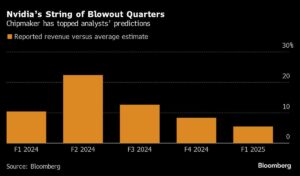Nvidia Hits Rough Patch: Blackwell Chips Production Snags
Nvidia Corp. left investors wanting more after its latest results and forecast disappointed Wall Street, causing its stock to drop in late trading. The company announced production issues with its highly-anticipated Blackwell chips, adding to concerns about the future of the tech giant.
The quarterly report, which is usually a highlight of the tech industry’s earnings season, did meet or exceed analysts’ expectations on most measures. However, Nvidia investors have become accustomed to stellar quarters, and this one fell short of that standard.
The new Blackwell processor lineup, expected to be Nvidia’s next big earner, has faced unexpected challenges in manufacturing. This news, along with the underwhelming forecast, caused the stock to plummet as much as 8.4% after the results were released. Despite this drop, Nvidia’s shares had seen exponential growth over the past year, more than doubling in value.
According to a note from Bloomberg Intelligence analysts, Kunjan Sobhani and Oscar Hernandez Tejada, the results were up against high and unsustainable expectations. Nvidia projected third-quarter revenue to be around $32.5 billion, slightly higher than the average analyst estimate of $31.9 billion.
The lackluster outlook has raised concerns about the AI market frenzy that has propelled Nvidia to become one of the most valuable companies globally. The company has been a key player in the push to upgrade data centers for AI software, with its sales forecasts serving as a barometer for this industry expansion.
Despite the setbacks with the Blackwell chips, Nvidia remains optimistic about the product’s potential. CEO Jensen Huang expressed his excitement for Blackwell, stating that it is a highly anticipated release.
Nvidia’s growth has been largely driven by a handful of major customers, with data-center operators contributing significantly to its revenue. Companies like Google and Meta Platforms have been investing heavily in AI infrastructure, boosting Nvidia’s sales in this sector.
The company’s success has made it the best-performing stock in the S&P 500 Index, surpassing other semiconductor companies by a wide margin. With a market value of over $3 trillion, Nvidia’s worth rivals that of the next 10 largest chip firms combined.
Nvidia made a name for itself with video-game cards but has since pivoted to focus on AI accelerators. These chips, derived from its graphics processors, are crucial for training AI models and running AI software efficiently.
In the past quarter, Nvidia exceeded Wall Street expectations, prompting its board to approve an additional $50 billion in stock buybacks. Revenue doubled to $30 billion in the fiscal second quarter, with strong performance across its data-center and gaming chip divisions.
While Nvidia faces competition from rivals like AMD and Intel in the AI market, its leading technology has helped it maintain its position as a market leader. The upcoming launch of the Blackwell chips is expected to drive further growth for the company.
Despite the production setbacks, Nvidia remains confident in its ability to meet demand for its current products while addressing challenges with Blackwell. The company plans to ramp up production in the coming months and expects significant revenue from the new chips in the fourth quarter.
Nvidia’s visionary CEO, Jensen Huang, sees a bright future for the tech industry, emphasizing the growing importance of AI in modern computing. He envisions a trillion-dollar market for data-center upgrades, illustrating the potential for Nvidia to continue its upward trajectory in the AI sector.
In conclusion, while Nvidia may have hit a snag with its Blackwell chips, the company’s long-term prospects remain strong. Investors should keep a close eye on how Nvidia navigates these challenges and capitalizes on the opportunities presented by the rapidly evolving AI market.

